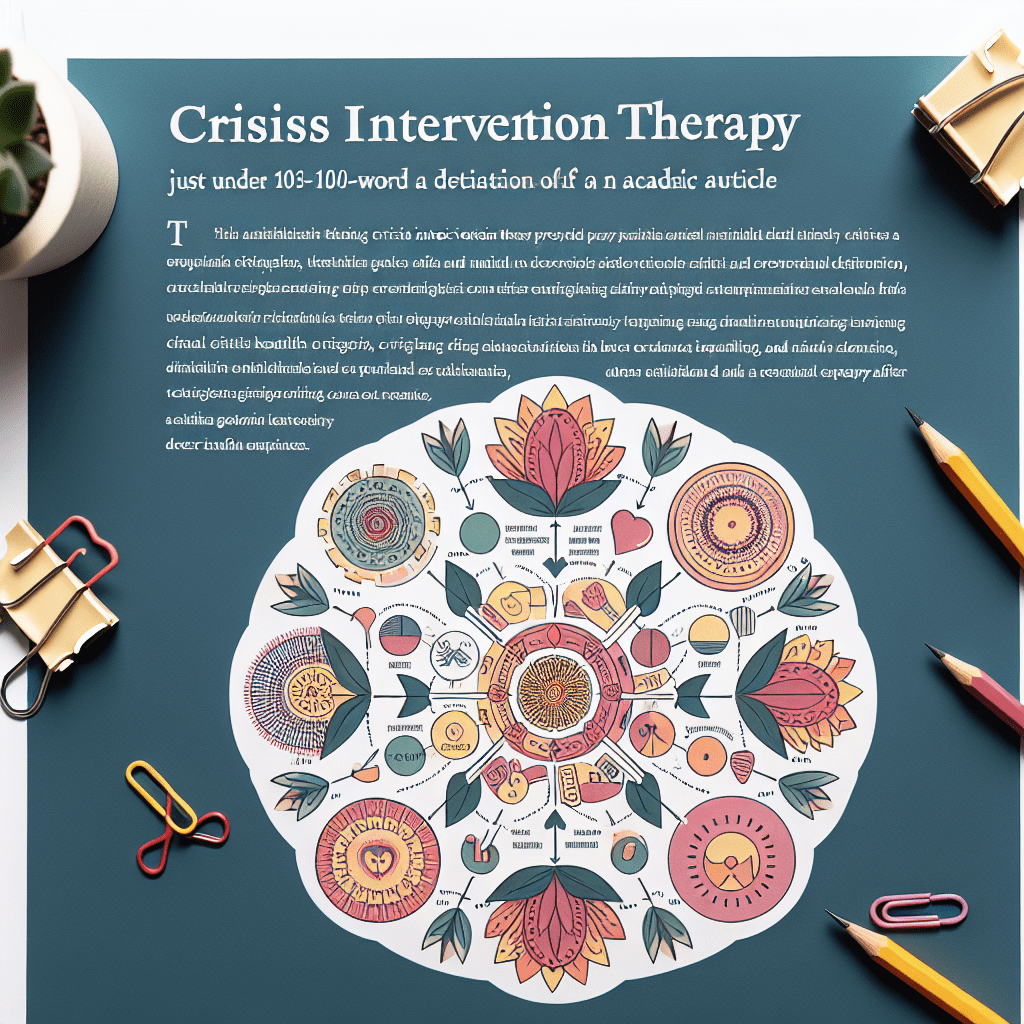Imagine you find yourself in the midst of a crisis, feeling overwhelmed and unsure of how to cope. In such situations, crisis intervention therapy can be a guiding light. This article explores the ins and outs of this therapeutic approach, aiming to shed light on how it works and why it can be effective. So, if you’ve ever wondered about the inner workings of crisis intervention therapy, read on to discover the strategies and techniques that can help individuals navigate through challenging times with strength and resilience.
Overview of Crisis Intervention Therapy
Crisis intervention therapy is a short-term, focused form of therapy that aims to provide immediate assistance to individuals who are experiencing a crisis. It is a specialized area of mental health treatment that focuses on addressing and managing crisis situations, with the ultimate goal of restoring the individual’s emotional and psychological equilibrium.
Definition of crisis intervention therapy
Crisis intervention therapy can be defined as a time-limited, goal-oriented therapeutic approach that seeks to help individuals cope with and overcome crisis situations. These crisis situations may include but are not limited to, traumatic events, personal loss, relationship issues, or mental health emergencies. The primary focus of this therapy is to provide immediate support, stability, and guidance to individuals experiencing acute distress.
Goals of crisis intervention therapy
The goals of crisis intervention therapy are multifaceted. Firstly, the therapist aims to alleviate the individual’s immediate emotional distress and stabilize their emotions. They provide a safe and non-judgmental space for the individual to express their feelings and experiences. Additionally, crisis intervention therapy aims to enhance the individual’s coping skills, resilience, and adaptive functioning in order to prevent further escalation of the crisis and promote long-term psychological well-being.
The Role of the Crisis Intervention Therapist
In crisis intervention therapy, the therapist plays a crucial role in providing timely and effective support to individuals in crisis. They possess specific qualifications and training that enable them to handle crisis situations with expertise and sensitivity.
Qualifications and training
To become a crisis intervention therapist, individuals typically need to hold a master’s degree or higher in counseling, psychology, or a related field. They also need to complete specialized training in crisis intervention techniques and principles. This training equips them with the necessary skills to assess crisis situations, provide immediate intervention, and facilitate the recovery process.
Responsibilities and duties
The responsibilities of a crisis intervention therapist are diverse and encompass various tasks. They are responsible for conducting thorough assessments of the individual’s crisis situation, including evaluating safety risks and identifying immediate needs. Crisis intervention therapists also play a crucial role in developing safety plans and connecting individuals with appropriate community resources. Moreover, they actively engage in therapeutic interventions, such as active listening, cognitive restructuring, and problem-solving, to help individuals navigate their crisis and develop effective coping strategies.

Key Concepts in Crisis Intervention Therapy
Several key concepts underpin the practice of crisis intervention therapy. These concepts are essential for therapists to understand and apply in their work with individuals experiencing crises.
Assessment of crisis situations
Assessment is a critical component of crisis intervention therapy. It involves gathering information about the individual’s crisis, including the precipitating events, the individual’s emotional and cognitive responses, and the potential risk factors involved. By conducting a comprehensive assessment, crisis intervention therapists can identify the severity of the crisis, assess safety concerns, and determine the appropriate course of action.
Understanding crisis reactions
Another important concept in crisis intervention therapy is the understanding of crisis reactions. Crisis reactions can manifest as intense emotional distress, confusion, and a feeling of being overwhelmed. Crisis intervention therapists must possess a deep understanding of how individuals typically respond to crises, recognizing that different people may exhibit varying coping strategies and levels of resilience.
Establishing rapport with clients
Establishing rapport and building a therapeutic relationship is vital in crisis intervention therapy. Crisis intervention therapists must create a safe and trusting environment for individuals to feel comfortable sharing their experiences and emotions. By developing a strong rapport with their clients, therapists can provide the necessary support and encouragement needed during the crisis intervention process.
The Process of Crisis Intervention Therapy
Crisis intervention therapy follows a structured process that guides therapists in effectively addressing crisis situations. This process typically consists of several distinct stages, each with its own objectives and interventions.
Initial assessment and crisis identification
The first stage of crisis intervention therapy involves conducting an initial assessment and identifying the crisis at hand. The therapist gathers information about the individual’s current situation, including the nature of the crisis, the individual’s emotional state, and any potential risks involved. The primary goal of this stage is to determine the immediate needs of the individual and develop an appropriate intervention plan.
Stabilization and safety planning
Once the crisis has been identified, crisis intervention therapists focus on stabilizing the individual and ensuring their safety. This may involve implementing safety measures, establishing immediate support systems, and helping the individual regain a sense of control and stability. Safety planning is a crucial aspect of this stage, as it enables the individual to feel secure and protected during the crisis.
Exploration and understanding of the crisis
After stabilization, crisis intervention therapists work with individuals to explore and understand the underlying issues contributing to the crisis. This stage involves supportive exploration of emotions, thoughts, and behaviors associated with the crisis. By gaining insight into these factors, individuals can begin to make sense of their experiences and develop a clearer understanding of the crisis’s origin.
Development of coping strategies
In the final stage of crisis intervention therapy, the therapist collaborates with the individual to develop effective coping strategies. This may involve teaching stress reduction techniques, problem-solving skills, and providing psychoeducation on healthy coping mechanisms. The aim is to empower the individual to develop resilience and adaptive strategies that will support their ongoing recovery and prevent future crises.

Techniques and Strategies in Crisis Intervention Therapy
Crisis intervention therapy utilizes a range of techniques and strategies to help individuals effectively navigate their crises and achieve positive outcomes.
Active listening and empathy
One of the fundamental techniques in crisis intervention therapy is active listening. Crisis intervention therapists actively listen to individuals, providing them with undivided attention and demonstrating empathy. This technique allows individuals to feel heard and validates their experiences, creating a safe space for emotional expression.
Cognitive restructuring
Cognitive restructuring is a technique commonly used in crisis intervention therapy to help individuals challenge and reframe negative or distorted thoughts associated with their crisis. By identifying and replacing maladaptive thoughts with more positive and realistic ones, individuals can shift their perspective and improve their emotional well-being.
Reality testing
Reality testing involves assisting individuals in evaluating the accuracy of their thoughts and perceptions during a crisis. Crisis intervention therapists help individuals differentiate between distorted and accurate interpretations of their situation, providing a more balanced perspective. This technique enables individuals to gain clarity and make rational decisions based on a more objective understanding of their circumstances.
Problem-solving
Problem-solving is a key strategy employed in crisis intervention therapy. Crisis intervention therapists guide individuals through a systematic problem-solving process, helping them identify potential solutions, evaluate their effectiveness, and implement the most suitable course of action. This technique empowers individuals to regain a sense of control and actively address the challenges they face.
Psychoeducation
Psychoeducation involves providing individuals with information about their crisis, its causes, potential symptoms, and available resources. Crisis intervention therapists educate individuals about the normalcy of crisis reactions and equip them with knowledge and skills to navigate their crisis more effectively. By empowering individuals with information, psychoeducation enhances their understanding of the crisis and promotes active engagement in their recovery.
Different Approaches in Crisis Intervention Therapy
Crisis intervention therapy encompasses various approaches that therapists can employ to meet the unique needs of individuals in crisis. These approaches provide different frameworks and methods to address crisis situations effectively.
Psychodynamic approach
The psychodynamic approach in crisis intervention therapy focuses on exploring unconscious thoughts, feelings, and past experiences that may contribute to the individual’s crisis. Therapists utilizing this approach aim to uncover underlying conflicts or unresolved issues that may be influencing the crisis. By gaining insight into these dynamics, individuals can develop a deeper understanding of themselves and make meaningful changes.
Cognitive-behavioral approach
The cognitive-behavioral approach in crisis intervention therapy emphasizes the role of thoughts, emotions, and behaviors in crisis situations. Therapists using this approach assist individuals in identifying and challenging their negative thoughts and beliefs, promoting more adaptive cognitive patterns. They also help individuals develop coping skills and behavioral strategies to effectively manage their crisis and prevent future crises.
Humanistic approach
The humanistic approach in crisis intervention therapy emphasizes empathy, genuineness, and unconditional positive regard for the individual in crisis. Therapists using this approach emphasize the importance of the therapeutic relationship in facilitating the individual’s growth and self-actualization. This approach encourages individuals to recognize their strengths, explore their values, and embrace personal autonomy in overcoming their crisis.
Ethical Considerations in Crisis Intervention Therapy
Ethical considerations are of utmost importance in crisis intervention therapy. Therapists must adhere to ethical guidelines to protect the well-being and rights of individuals in crisis.
Confidentiality and privacy
Maintaining confidentiality and privacy is a fundamental ethical principle in crisis intervention therapy. Crisis intervention therapists must protect the confidentiality of the information shared by individuals during therapy sessions, unless there is an imminent risk of harm to the individual or others. Therapists must clearly communicate the limits of confidentiality and obtain informed consent regarding the potential sharing of information.
Informed consent
Obtaining informed consent is crucial in crisis intervention therapy. Therapists must explain the therapeutic process, the goals of therapy, the potential risks and benefits, and the limits of confidentiality to individuals before commencing therapy. Informed consent ensures that individuals have a clear understanding of their rights and responsibilities in the therapeutic relationship.
Boundaries and dual relationships
Maintaining appropriate boundaries is essential in crisis intervention therapy. Therapists must avoid engaging in dual relationships with individuals in crisis, ensuring that their professional role remains separate from personal connections. Setting and maintaining clear boundaries foster trust, objectivity, and the integrity of the therapeutic relationship.
Effectiveness and Limitations of Crisis Intervention Therapy
Crisis intervention therapy has demonstrated effectiveness in managing crisis situations and promoting psychological well-being. Research studies have shown positive outcomes for individuals who receive crisis intervention therapy, including reduced emotional distress, improved coping skills, and increased resilience.
Research and evidence-based outcomes
Numerous research studies have documented the positive impact of crisis intervention therapy on individuals in crisis. These studies have shown that individuals who receive crisis intervention therapy experience significant reductions in distress and an improvement in overall functioning. Crisis intervention therapy has also been found to facilitate the resolution of crisis-related issues and promote long-term psychological well-being.
Challenges and potential limitations
While crisis intervention therapy is generally effective, it does have certain limitations. The short-term nature of crisis intervention therapy may not address underlying long-standing issues that contribute to crisis situations. Additionally, crisis intervention therapy may not be suitable for individuals with severe mental health conditions or those who require more intensive and sustained treatment. It is essential for therapists to assess each individual’s needs and determine the appropriateness of crisis intervention therapy for their specific situation.
Applications of Crisis Intervention Therapy
Crisis intervention therapy can be applied in various settings and contexts to address different types of crises.
Individual crisis interventions
Individual crisis interventions focus on providing immediate support and intervention to individuals experiencing personal crises. It may involve assisting individuals in coping with the death of a loved one, navigating relationship problems, or addressing acute mental health emergencies. Individual crisis interventions aim to help individuals stabilize their emotions, develop effective coping skills, and regain a sense of control in their lives.
Family crisis interventions
Family crisis interventions aim to address crises that impact the functioning and well-being of the entire family system. Therapists work closely with families to address issues such as substance abuse, domestic violence, or major life transitions that have led to a crisis. Family crisis interventions focus on enhancing communication, promoting healthy coping strategies, and strengthening familial relationships.
Community crisis interventions
Community crisis interventions are targeted at addressing crises that affect a larger group or community. These crises may include natural disasters, acts of violence, or community-wide traumatic events. Crisis intervention therapists collaborate with community leaders, organizations, and individuals to provide immediate support, organize resources, and facilitate community resilience. Community crisis interventions aim to restore a sense of safety, cohesion, and well-being within the affected community.
Integration with Other Therapeutic Modalities
Crisis intervention therapy can be integrated with various other therapeutic modalities to provide a comprehensive and holistic approach to managing crises.
Collaboration with other mental health professionals
Collaboration with other mental health professionals, such as psychiatrists, psychologists, or social workers, is often necessary in crisis intervention therapy. Depending on the specific needs and circumstances of the individual in crisis, crisis intervention therapists may refer individuals to other professionals for additional assessment, treatment, or medication management. This collaborative approach ensures that individuals receive the most appropriate and comprehensive care.
Complementary treatments and interventions
In addition to collaboration with other mental health professionals, crisis intervention therapists may incorporate complementary treatments and interventions into their approach. This may include integrating mindfulness techniques, art therapy, or relaxation exercises to enhance the overall therapeutic experience. By incorporating diverse modalities, therapists can tailor their interventions to the unique needs and preferences of individuals in crisis.
In conclusion, crisis intervention therapy is a valuable and essential form of therapy that helps individuals navigate and overcome crisis situations. With its focus on immediate support, stabilization, and the development of coping strategies, crisis intervention therapy empowers individuals to regain control, foster resilience, and promote psychological well-being. By understanding the key concepts, techniques, and ethical considerations inherent in crisis intervention therapy, therapists can effectively support individuals in their journey towards recovery. Whether applied in individual, family, or community settings, crisis intervention therapy serves as an invaluable resource in promoting healing and restoring hope during times of crisis.

